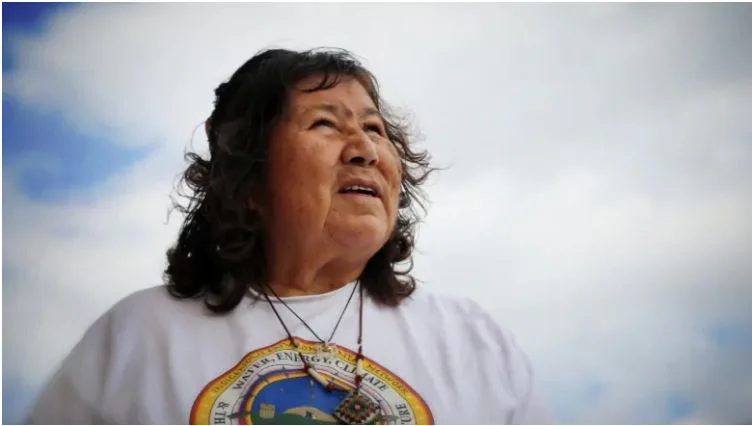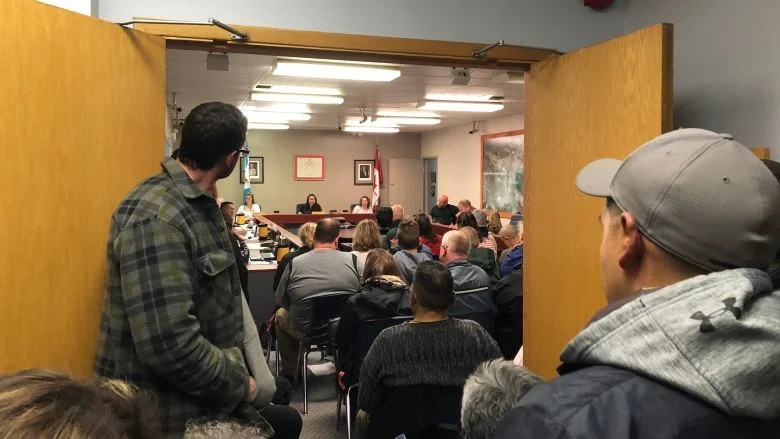AFN Manitoba Regional Chief Cindy Woodhouse spoke at the United Nations Water Conference recently in New York to highlight the rights of First Nations when it comes to safe drinking water. Woodhouse talked about water governance and the need for intensified action to realize the human right to safe drinking water and sanitation for all indigenous peoples. Some 10,000 participants gathered at UN Headquarters and online from March 22-24 to address the water crisis and “ensure equitable access to water for all.”
Regional Chief Cindy Woodhouse (Manitoba) Calls for Support of First Nations-Led Water Priorities and Realizing the Human Right to Safe Drinking Water
Manitoba Regional Chief Cindy Woodhouse of the Assembly of First Nations spoke at the United Nations Water Conference in New York, advocating for the rights of First Nations in any action related to water governance. She emphasized the need for intensified action to achieve safe drinking water and sanitation for all Indigenous peoples, which is a fundamental human right.
IMPAC5
Or consider how climate change is also melting ice and glaciers in the Arctic. For Inuit, this means that the traditional way of life is being disrupted and destroyed. That same ice melt is also raising water levels, endangering coastal communities and island nations. Tuvalu, for example, is building a digital version of its country to preserve its history, culture and language. If things continue on this course, there is a good chance the nation will be submerged by the end of the century.
The best Canadian nonfiction of 2022
Maude Barlow counters the prevailing atmosphere of pessimism and offers lessons of hope that she has learned from a lifetime of activism in the memoir Still Hopeful. Barlow has been involved in three major movements: second-wave feminism, the battle against free trade and globalization and the fight for water justice. She emphasizes that effective activism is about building a movement and finding like-minded people rather than making the goal the focus.
Zann's environmental racism bill finally pushing through House of Commons
Canada’s first environmental racism bill was back before the House of Commons this week after the committee studying the bill approved it without amendment. The bill was first tabled by former Nova Scotia MP Lenore Zann in February 2020. “Environmental racism is something that has been ignored for far too many years,” Zann, the Liberal MP for Cumberland-Colchester, said in bringing forth the private member’s bill for second reading in the House of Commons on Dec. 8, 2020.
This week’s mailbox: Yukon’s water and John Streicker’s car
Water is essential to life and common to everything that lives. It is our most precious resource and, therefore, needs our protection. This is precisely what Maude Barlow, Canada’s renowned water advocate, has argued for years. In her most recent book, Whose Water Is It Anyway?, she states that a water secure and a water-just future depends upon our adoption of four principles: “1. Water is a human right and an issue of justice and charity; “2. water is a common heritage and public trust and, therefore, access to water must not be allowed to be decided by private, for profit interests; “3. water has rights beyond its service to humans and must be respected and protected for the ecosystem and other living beings; and “4. rather than being a source of conflict and division, water can be nature’s gift to teach us how we might learn to live more lightly on the planet and in harmony with one another.”
Canadians could soon have the legal right to a healthy environment. But can it be enforced?
Canada has joined much of the rest of the world in adopting a United Nations resolution recognizing that a healthy environment is a human right. But a bill making its way through Parliament to codify this right into law may need to change to be truly effective. While Environment and Climate Change Minister Steven Guilbeault has promoted the resolution’s “principles” as being in line with the bill, a Canadian UN special rapporteur has said the legislation “should be strengthened” and noted it is not consistent with the approach taken by the UN Human Rights Council and the UN General Assembly.
Still hopeful after all these years
When I was teaching political science at Langara College in Vancouver, some of the most memorable events were the half dozen teleconferences Noam Chomsky did with my students. During one such discussion of international trade treaties in 2012, Chomsky singled out the work of Maude Barlow, then chair of the Council of Canadians, as being instrumental in defeating the proposed “corporate bill of rights” known as the Multilateral Agreement on Investment.
Get them Clean Water
Imagine, after a nice run, you go to hydrate yourself. You turn on the tap and the water that comes out is the same shade as tree bark. This is what First Nations communities have to go through on a daily basis. Clean water is not a privilege, but a human right. It doesn’t take more than a Google search to find out what’s going on in First Nations reserves across the country, yet the government of Canada seems to not be making it a priority. While we in the city complain about vaccines, masks and not being able to attend large gatherings, Indigenous communities are suffering with the lack of clean and filtered water. We all understand the importance of water. We clean ourselves with it, cook with it and hydrate ourselves with it. Seventy per cent of our body is made up of water.
Join AquaAction and the de Gaspé Beaubien Foundation as they Launch a Nationwide Awareness Campaign to Highlight Innovative Solutions to Critical Freshwater Issues in Canada
AquaAction, a Canadian organization dedicated to restoring freshwater health in Canada by engaging young innovators and activating their solutions, kicked off a multi-million-dollar media campaign aimed at raising awareness about critical water issues and the cutting-edge solutions that are emerging to solve them. "As we mark World Water Day 2022, we want to shine a light on the brilliant young innovators who are working to solve some of the most critical issues we face with regards to freshwater in Canada. Access to clean water is a human right and is essential to the health of our communities, eco-systems and economies. We need to urgently mitigate and adapt to the impact of a changing climate, and we believe in the ingenuity of young Canadians and their innovative solutions when it comes to restoring and preserving freshwater health as we do so," said Francois de Gaspe Beaubien, Chair of the Board of AquaAction.
How London became a 'blue community'
London has been officially recognized as a “Blue Community” for its commitment to safe drinking water. The Council of Canadians presented a certificate to Mayor Ed Holder and the city’s water department during a ceremony in front of City Hall Wednesday. The Blue Community Project requires the adoption of the following framework: recognizing water and sanitation as a human right, banning the sale of bottled water at municipal facilities and events, supporting publicly owned and operated water and wastewater services.
Thorold to ask region to reopen water testing
Thorold councillors unanimously supported writing a letter to their Niagara Region counterparts to show they’re ready to resume water testing in the city. “In 2002, the United Nations stated that water is a human right, clean water is a human right, and we’re in 2021 and this is an issue now in Thorold,” said Thorold councillor Carmen DeRose. At the meeting on May 4, DeRose brought the issue to the council’s attention after residents had reached out to him.
London now 'Blue Community' for water stewardship efforts
The City of London has joined the likes of Berlin, Paris and Los Angeles in joining the world's 'Blue Community' movement. In a Blue Community, water and water sanitization are considered a human right, with the city not cutting off water to those struggling to pay for it, rejecting privatization of water services and not selling bottled water at municipal properties.
Water is a human right: Advocacy group dives into water crises affecting Indigenous populations
For most people, this simple routine is so commonplace that we take it for granted. But for 38 Indigenous communities across Canada, this is not the reality. The water they need for drinking, washing and bathing must first be boiled for at least one minute until it is safe to use. “I think water should be the right of all our people, regardless of how many people are living on a certain reserve. If there is an accessible water source then they should be doing what they can to provide potable drinking water for that community,” says Warren Brown, manager of Lytton First Nation O&M Department Operation.
Can Wall Street help us find the true price of water?
Despite the apparent abundance of water in Canada, she said, low prices mean the best-quality water in many regions — such as Southern Ontario groundwater — is in increasingly short supply and is being overused. Roy Brouwer, executive director of the Water Institute at the University of Waterloo, said that when he came to Canada from the Netherlands five years ago, he was surprised by the low price and wasteful misuse of water in this country.
Ottawa to probe contractors hired to fix longest-standing boil water advisory
Indigenous Services Minister Marc Miller is preparing to launch a third-party investigation into the business practices of consultants and engineering companies hired to end Canada's longest-standing boil water advisory — a probe that could extend to other communities, CBC News has learned. "The problem is we have a system for delivering infrastructure that always goes with the lowest bidder," Angus said. "When you have a big-ticket item, like a water plant that's very expensive to build in a community, costs and corners get cut and that's the danger. Neskantaga has been a nightmare situation."
Laced with fear: why some Ontario First Nations don't trust tap water or eat the fish
Water is something most Canadians take for granted. We have so much of it, it's no wonder. Per capita, our country has the world's third-largest freshwater reserves, but yet in many Indigenous communities, water can be difficult to access, at-risk because of unreliable treatment systems, or contaminated. That's the case in Delaware First Nation, an Indigenous community of about 500 people an hour southwest of London, Ont., a place where fishing was everything 60 years ago.
Iqaluit residents speak out on trucked water, sewage services
The public gallery at Iqaluit city hall was packed for Thursday night's public consultation on a bylaw that governs the city's water supply and sewer service. However, with increasing water restrictions due to low levels in the city's water supply from Lake Geraldine, people came out en masse to talk about water usage in general.



















